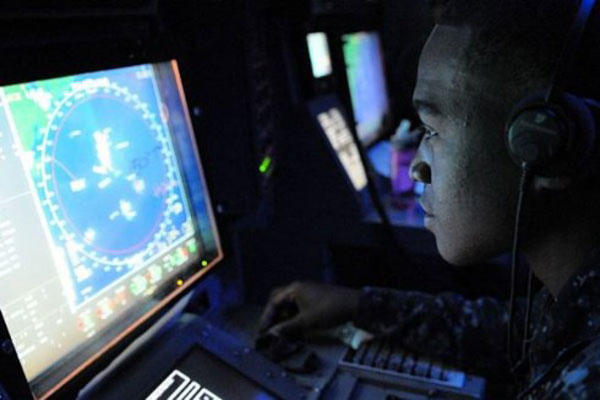The Navy's information warfare experts are taking on a new name. As of this month, information warfare officers responsible for signals intelligence, cyber operations and electronic warfare ops will be known as cryptologic warfare officers.
The change was announced this week by Vice Adm. Jan Tighe, head of U.S. Fleet Cyber Command and commander of the U.S. 10th Fleet.
Navy officers with 181X, 681X and 781X designators will be affected by the change, according to a Monday news release from Fleet Cyber Command and 10th Fleet.
The new title reverses a change made in 2005, when the sailors then known as cryptologic officers were renamed information warfare officers "to reflect the expanded competencies of information operations and cyber warfare," according to the Navy's information technology magazine, CHIPS.
The change back, Tighe said in the release, was an homage to history and a cryptology community established 81 years ago.
"This choice honors our cryptologic heritage, reflects the military effects we deliver in the converged domain and more closely ties our officers with our enlisted and civilian force counterparts," she said.
The release notes that cryptologic warfare is just one element of the larger information warfare community, which also includes meteorology and oceanography, information professionals, and intelligence. Renaming information warfare officers as cryptologic warfare officers also helps make that distinction.
The name change is one in a series for the Navy's information experts: In January, Deputy Chief of Naval Operations for Information Warfare Vice Adm. Ted Branch announced that what was formerly known as the Information Dominance Corps would be reflagged as the Information Warfare Community.
"We need to stay aligned with CNO's messaging and consistent in our terminology," Branch wrote in a message to sailors announcing the change. "... This aligns with Air Warfare, Surface Warfare, Undersea Warfare, etc., and furthers our efforts to mainstream information warfare as one of four predominate warfare areas."
Tighe said this move provided an opportunity to evolve and examine the community's identity.
"Whether we are executing mission under joint commanders, fleet commanders, National Security Agency, U.S. Cyber Command -- and whether significant portions of our missions are organized under Communications Security Group, Naval Security Group, Naval Network Warfare Command or today's FCC/C10F-- we have our own enduring identity, culture and ethos," she said.
-- Hope Hodge Seck can be reached at hope.seck@monster.com. Follow her on Twitter at @HopeSeck.






























